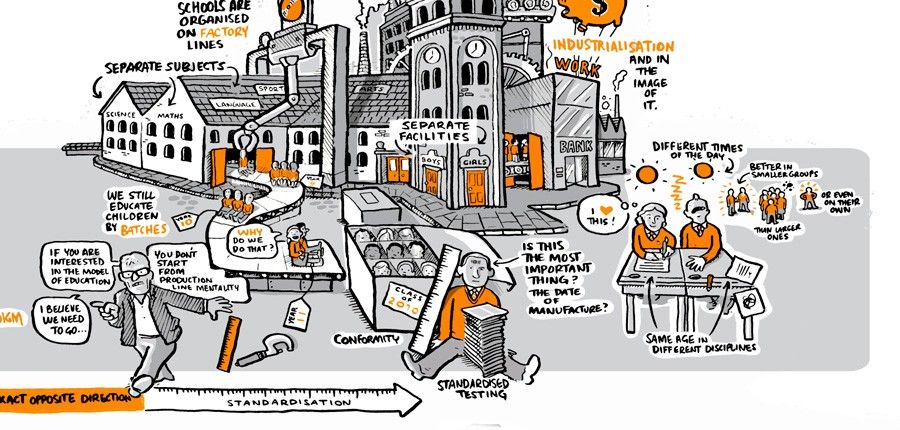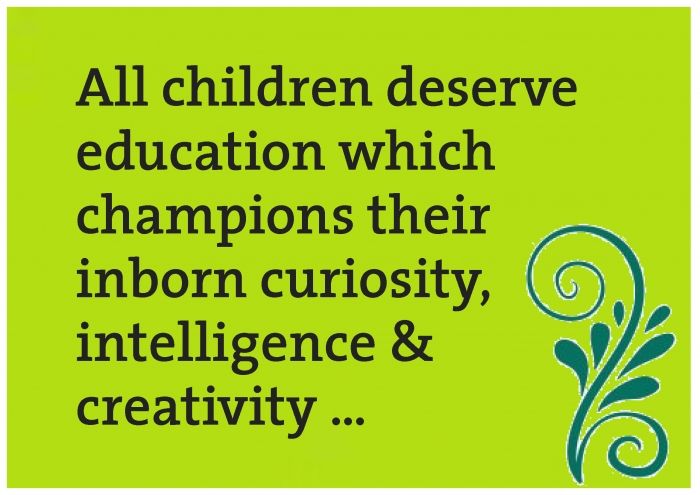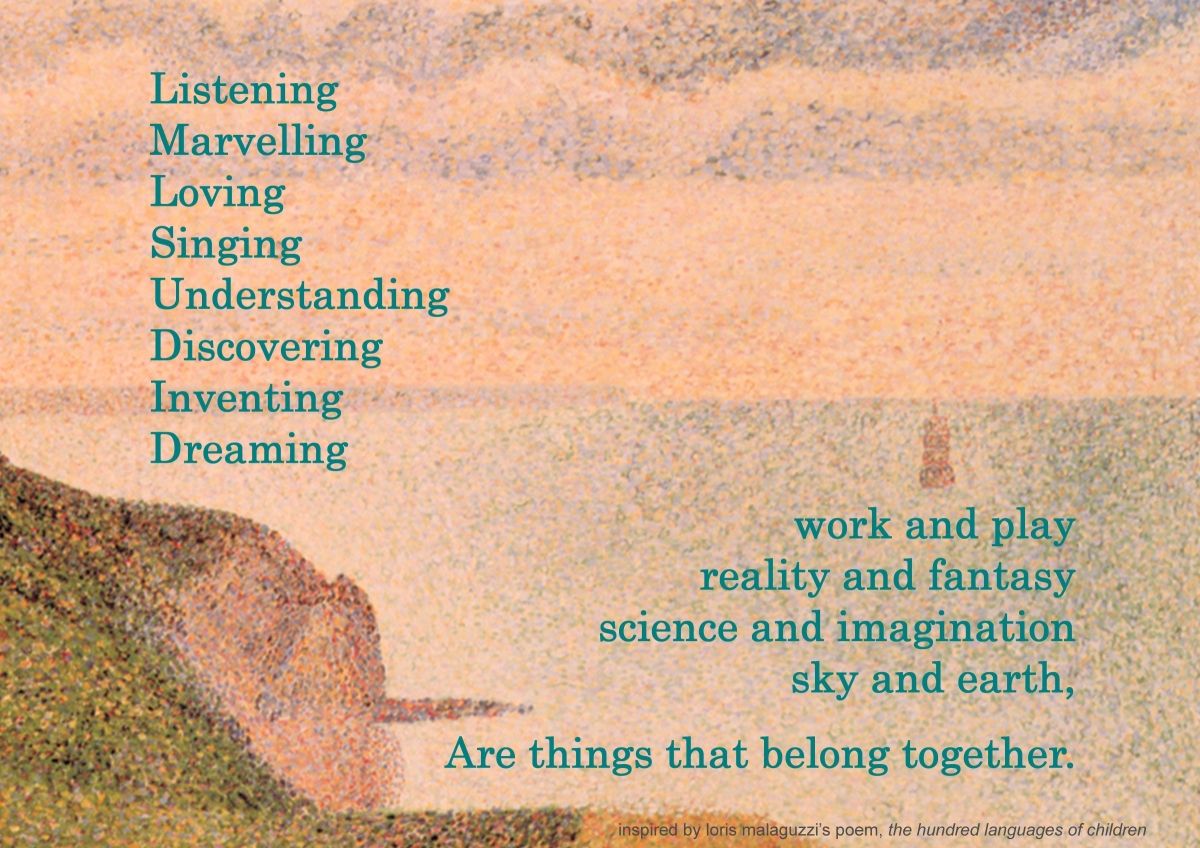Principles
But what is being dished out?
There is an urgent need to transform education in ways that can do justice to the huge potential of all children and make it fit to fulfil its many purposes and that re-introduce into education essential qualities of creativity, pleasure, conviviality and wonder.
Education in England today is failing children and society with a narrow instrumental focus (acquisition of limited range of skills), a culture of managerial accountability with an obsession with standardised testing, schools as ‘outcome factories’, and a deep distrust and low expectations of children and educators. It squanders the rich potential of children, educators and schools and to develop an education relevant to the challenges and opportunities of today’s world.
This is equally the case in the early childhood sector which is predominantly created around the idea of the individual child developing skills, where children are judged and measured against predetermined expectations in order to ‘become ready’ for the next stage.
Research shows that the dominant culture of education is having a severe negative impact on children’s mental health and well-being: February 2021 File on Four research , Children’s Society Good Childhood Report.
Countless great educators have emphasised the importance of learning in groups, of collaborative work, of research and creativity… of transforming the educational paradigm from a pedagogy of transmission and reproduction to a pedagogy of relationships and enquiry. For example:
Sir Ken Robinson: “we are living with a construct of education based on an outdated model of training for an industrial, growth economy…capacity for divergent thinking deteriorates with schooling…children alienated, not engaged, lacking aesthetic experience." Changing Educational Paradigms
 RSA: Changing Educational Paradigms / Sir Ken Robinson / 2010
RSA: Changing Educational Paradigms / Sir Ken Robinson / 2010
Imagine something healthier ...
 There is certainly a wider-spreading unhappiness about the state of affairs of education in the UK (especially in England where Westminster is not encouraging open dialogue.) However it is not popularly clear/acknowledged/understood that education’s heart is misplaced: the idea that education can be articulated differently is not ‘out in the open.’ Government’s policy work keeps everyone focussed within the concept of 'education-as-transmission.’
There is certainly a wider-spreading unhappiness about the state of affairs of education in the UK (especially in England where Westminster is not encouraging open dialogue.) However it is not popularly clear/acknowledged/understood that education’s heart is misplaced: the idea that education can be articulated differently is not ‘out in the open.’ Government’s policy work keeps everyone focussed within the concept of 'education-as-transmission.’
Paraphrasing Loris Malaguzzi’s famous poem: The child has – a hundred ways of thinking, playing, of speaking, of marvelling, of loving – But – the school and the culture steal ninety-nine. They separate the head from the body: they tell the world that work and play, reality and fantasy, science and imagination, sky and earth, reason and dream, are things that do not belong together.

Cooking it up ...
A Pedagogy of Relationship & Enquiry
Now: What can this look like? How to plan? to be? Our project work explores these questions more deeply, and through these and many many conversations we've developed a working set of action principles .. which in turn informs our professional development programmes ...
Here is a 10-minute video introduction to our principles and basis of our pedagogical framework:
Our project is grounded in the mission to inhabit a shifted paradigm of education. The shift is from the industrial, transmissive premise to one which has at its centre the championing of curiosity, researchfulness, enquiry.
This has been a core design principle of Sightlines Initiative from the outset.
We begin by recognising that the child is innately a creative active and sociable learner from birth; secondly we recognise that therefore places of education should be designed around supporting what Whitehead calls 'this zest for learning.’ It is a core feature of what makes us human.
We have called this ‘an environment of relationship & enquiry’ with characteristics of Encounter, Enquiry, Exchange, Expression.
It is ‘relationship-focussed’ because the aim, organisation and overall attention of the educational environment is designed to work with the natural ‘zests’ of humans to enquire, to make sense of the world, with others, to be in relationship.
Specific characteristics include
- Sociable, democratic education in which children are respected and heard
- Educators and children learning side by side – learning to learn and create together (adults researching children researching the world); constructing understandings together (co-construction of knowledge)
- Relationships with all the elements of the natural world
- Relationships with different media and the multiple forms of expression / communication
- Children working, exploring, learning together in authentic learning groups
- Active participation includes children, educators, families, community working together
Where this paradigm shift has been wholeheartedly embraced we see children extremely eagerly engaged together in highly sophisticated and reflective project work, with high levels of skill in environments in which their learning is clear and visible. Schools become properly places of research, where educators and children are dynamically developing (co-constructing) living [organic] learning experiences.
The work of the preschools of Reggio Emilia, Italy, are an outstanding example of this.
We hope you can see the spirit of this evidenced in the many examples of our project work in our publications and on our projects pages.

